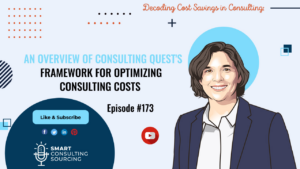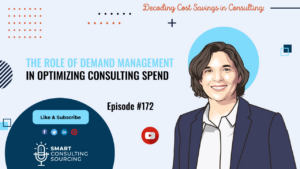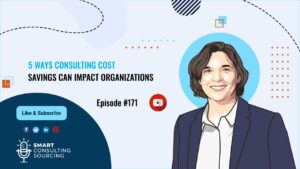Welcome, dear listeners, to another enthralling episode of Smart Consulting Sourcing, your go-to podcast for consulting procurement. I’m your host, Helene, and I’m thrilled to have you join us on this journey as we delve into “How to buy consulting services like a pro.” Today, we embark on the final step in our quest: analyzing the consulting proposals.
In our previous episodes, we laid the groundwork for success, covering topics such as bringing the right team, evaluating deliverables, assessing approaches, and more. We’re ready to bring it all together and unravel the mysteries of effective consulting proposal analysis. So, grab your notepads and sharpen your critical thinking skills because we’re about to dive into the fascinating world of scrutinizing those captivating consulting proposals.
Let’s recap the key points from our last episode before diving into today’s discussion.
First of all, remember that it’s critical to focus on finding a solution that meets your specific needs and delivers the desired outcomes.
Ensure that each proposal clearly lists the expected deliverables. Comparing these deliverables to your original requirements will help you determine which proposal is most closely aligned with your needs.
Then you have to assess the different approaches for executing the project. Is the approach feasible and adaptable to your specific needs? Are there any potential limitations or challenges that may arise during the project’s execution? Does the proposed timeline match your internal objectives and if not, what is the rationale behind this change?
The phasing of the project is another critical element to scrutinize. Confirm each phase includes the same work and deliverables specified in your initial requirements.
Don’t overlook the governance of the project either. Understand how the project will be managed at both the steering and working levels, and clarify the expected support from your internal teams throughout the process.
Seek clarity and transparency in the content of the proposal as well. Make sure you understand the details of the work, the responsible parties for each task, and the proposed execution plan. Be cautious of overly brief proposals lacking sufficient information.
Remember to assess whether the size of the team proposed for the project aligns with the workload. This includes evaluating if the team is too big or too small, and taking into account the availability of your own team to provide effective project support.
Make sure to pay close attention to the balance between on-site and off-site work. Check that the proposal matches your preferences for whether the consultants will be physically present or working remotely.
If you weren’t able to listen to our previous episode, don’t worry! You can find it on your preferred listening platform. Our episodes are available on Spotify, iTunes, and YouTube, so you can choose which one works best for you.
If you prefer reading, we’ve got you covered too! Go to consultingquest.com and visit the Thought Leadership section. You’ll find the complete transcript of our episodes there. Take your time to read it, and don’t hesitate to share it with your friends and colleagues.
Consulting Proposal Analysis — How to Examine the Technical Aspects as Well as Human Components?
Without wasting another moment, let’s dive straight into our scintillating topic of the day: the art of analyzing proposals and the thrilling task of grading them in preparation for the highly anticipated pitch sessions. But hold on tight, because there’s more to it than just assessing the technical aspects. We need to take a closer look at the human components that can make or break a consulting project.
Beyond the technical proposal, which outlines the approach, deliverables, and timeline, the team’s experience and their ability to seamlessly integrate with your own teams are crucial success factors. This step becomes particularly important if it’s your first time working with consultants or if you’re inviting new consulting firms into the RFP process. However, even with existing incumbents, don’t let familiarity cloud your judgment. You still want the absolute best team for your project.
Decoding The Human Equation: Key Questions for Evaluation
So, let’s evaluate the human side of things. Here are some key questions to consider:
Does the consultant truly understand your business and your market?
A proposal lacking detailed insights into your specific needs often indicates a limited understanding of your business, a hastily prepared or generic submission. Don’t compromise when it comes to this aspect.
Are the references provided in the proposal relevant to your project?
Take a closer look at the companies mentioned and the case studies presented. Do they align with your project’s scope, industry, region, complexity, and other relevant factors? Also, ask whether the references are recent and if it’s possible to contact them directly for further confirmation.
Is the project team senior enough to command credibility with your own teams?
Assess the level of seniority of the partner in charge. Are they personally taking responsibility for the project, or are they delegating it to someone more junior? Evaluate the overall experience and expertise of the project team and consider whether their level of seniority will align effectively with your teams and your needs.
Fit Check: Assessing Consultants’ Alignment Your Organization
Now, let’s shift our focus to assessing the fit of the consultants with your organization. Remember, consulting is not just about fancy reports and snazzy PowerPoint slides—it’s a human-to-human business, built on trust, relationships, and maybe a few inside jokes.
First things first, do you think these consultants will work well with your teams? Have you had any interactions with them that make you go, “Hey, these folks could be a match made in consulting heaven”? Consider the team composition and think about how they’ll fit in with your crew. After all, you want a harmonious collaboration, not a wrestling match of egos.
And let’s not forget about that all-important future buy-in from your teams. Will they raise a glass and say, “Cheers, we love working with these consultants!” or will they roll their eyes and mutter, “Here we go again”? Take a moment to ponder if the proposed approach and working style will resonate with your team’s vibe. You want to build a consulting dream team, not unleash a consulting nightmare.
Reality Check: Is the Consultant’s Approach a Right Match for Your Organization’s Needs and Values?
Now, let’s talk implementation. Some approaches might seem as tempting as a box of freshly baked donuts—they look irresistible! But here’s the reality check: they might not quite fit the unique context and culture of your organization. So, put on your reality glasses, and evaluate if the proposed approach is truly a match for your organization’s needs and values. You want a solution that’s as satisfying as a perfectly brewed cup of coffee, not a sugary treat that leaves you with a stomach-ache.
Making a Choice – Does Your Project Need a Consulting Brand?
Do You need a consulting brand for your project? Now, this happens to be a frequently asked question. Here’s the deal. Sometimes, delivering a great project isn’t enough. You need that extra oomph to convince those other stakeholders that the job was done seriously. That’s when the power of a consulting firm’s brand and credentials comes into play. It’s like having a shiny badge of honor that showcases the expertise and track record of the consultants who’ve worked their magic.
But hold on tight, because we’re not done yet. Are you in search of a doer or a gatherer? It’s like choosing between Batman and Superman, each with their unique superpowers to save the day.
For certain projects, especially those with sensitive implementation requirements, you need a “doer” who can roll up their sleeves, dive into the nitty-gritty details, and make things happen. They’re like project superheroes who thrive in the face of challenges, ensuring that every task is completed with precision and efficiency.
On the other hand, there are moments when you need a “gatherer” to bring everyone together, align the stars, and create a harmonious symphony of collaboration. They’re the master facilitators, adept at fostering a sense of unity and ensuring that all stakeholders are on the same page. Their superpower lies in navigating through uncertainties and making sure that whatever is accomplished sticks around for the long haul.
Different objectives call for different consulting profiles. So be clear on what you really need and look for the proposals that fit the bill.
Defining the Value Boundaries of the Project
And last but certainly not least, my dear consulting procurement enthusiasts, let’s talk about the value you expect from the project. It’s time to put on those strategic thinking caps and consider the bigger picture. Ask yourself, what value will this project bring to your organization? Will it be a technical added value, directly impacting your bottom line? Or perhaps a political added value, enabling other projects to thrive?
Take a moment to define the value boundaries of the project. What is the potential value if the project is successful? Are we talking about substantial benefits to your bottom line? And let’s not forget about the flip side—what are the risks if things don’t go according to plan? Could your company face a major setback? It’s crucial to weigh the potential rewards and risks before making any decisions.
Scrutinizing the Budget Construct
Now, let’s talk numbers—budget! As we say in French, “Le nerf de la guerre” — the nerve of war. When it comes to consulting projects, the budget plays a pivotal role in making strategic decisions and ensuring financial success. If you’ve tackled similar projects in the past, you may already have a ballpark figure in mind. However, keep in mind that factors like complexity, expertise required, project duration, and location can significantly impact the price tag. Plus, you might be working within a budget envelope that should not be exceeded. So, be prepared to balance your expectations with the realities of financial constraints.
But here’s the kicker—do you truly understand how much you’ll be paying in the end? Take a moment to scrutinize the budget construct. Is it straightforward and easy to understand? Are there any potential hidden costs lurking in the shadows? You want to ensure transparency and clarity when it comes to the financial aspects of the proposal.
Lastly, consider how the proposal price aligns with your budget. We all love a good surprise, but not when it involves a proposal that’s 50% over budget. Likewise, a shallow proposal that barely scratches the surface within your budget may not be the best option. Seek that sweet spot where the proposal’s price aligns with your financial realities while still delivering the value you expect.
Separating the Wheat From the Chaff – Grading Consulting Proposals
And there you have it, my dear listeners—a comprehensive 360-degree view of the proposal evaluation process. We’ve covered all the essential aspects, from understanding your objectives to evaluating deliverables, assessing approaches, analyzing team fit, considering the value, and scrutinizing the budget. It’s been quite a journey, but we’re not done just yet.
Now that you have a well-organized proposal in your hands—one that ideally addresses most, if not all, of the questions we’ve discussed—it’s time to shift gears and enter the exciting realm of proposal grading. This is where you separate the wheat from the chaff, identifying the most promising proposals that deserve a chance to shine.
For smaller projects with a shortlist of consulting candidates, this step may be almost non-existent. You can jump straight into inviting those already shortlisted consultants to bid. However, for larger projects or when you have a longer list of potential consultants, grading the proposals becomes crucial. It allows you to focus your attention on the most promising ones, saving you time and effort.
Regardless of the number of companies you’re considering, it’s important to start forming a preliminary “podium” of the best proposals. While it may be challenging to fully grasp the project’s intricacies before engaging with consulting firms, you can still identify the strengths and weaknesses of their written proposals.
To simplify the process, rank the proposals based on a limited number of criteria. The assessment of the proposals can serve as a solid foundation for this ranking. As you review the different bids, you’ll quickly notice that some consultants have provided comprehensive answers to all the questions, while others may have left certain aspects unanswered.
At the end of the assessment, you’ll be able to assign ratings to the proposals across various dimensions. Consider organizing these dimensions into six major themes: objectives, deliverables, approach, experience, fit, and budget (ideally that should reflect the criteria you have mentioned in your RFP). Adopting a simple grading system, such as a 5-star rating, can make it easier to both assign and interpret the grades. The goal is to have an overview of the proposal quality and arrange meetings with the consultants in order of relevance.
Now that you’ve identified the weaknesses in the proposals during the assessment process, it’s crucial to articulate and share these points with the consulting firms. Write down these concerns and consider what questions could help clarify the consultants’ true positioning on those dimensions. If you have cost-related concerns, don’t hesitate to ask for clarifications on the cost structure or explore potential trade-offs to align with your budget.
This list of questions will serve as the foundation for your meetings with the consultants. It will enable you to clarify their proposals and gain a comprehensive understanding of their ability to support you in achieving your goals. We recommend sending these questions ahead of time to allow the consulting firms to prepare and come equipped with well-thought-out answers.
As we approach the final stretch of our journey on analyzing consulting proposals and selecting the perfect consultant, let’s take a moment to reflect on the key points we’ve covered in the last three episodes. These insights will serve as your compass as you prepare the pitch sessions with the consultants.
First and foremost, don’t rush through the evaluation process. Take the time to review and assess all the written consulting proposals thoroughly. By grading them and identifying the most promising options, you lay the foundation for a successful selection process.
Remember that the ultimate goal is to find a consultant who can effectively solve your problem. It’s not just about choosing the most brilliant or the cheapest consulting proposal—it’s about finding the one that truly addresses your needs and delivers the desired outcomes.
Skills and expertise play a crucial role in selecting the right consultant. Dig beneath the surface and ensure that the consultants have the necessary knowledge and capabilities to tackle the challenges specific to your business or industry.
Consider the fit with your teams. Consulting projects often require collaboration between your internal teams and the consultants. Picture how the project will unfold and assess if the proposed consultants will integrate well with your existing teams. If you can’t envision a harmonious collaboration, it may be an indication that the consultant is not the right fit for your organization.
Last but not least, budget matters. Ensure that the price of the proposal aligns with your budget and the value you expect to gain from the project. Balancing the expected benefits with the cost of the services will help you make a well-informed decision.
You’re Now Pitch-Perfect – Time to Put Shortlisted consulting Proposals to the Test
Armed with these key points, you are now prepared for the exciting pitch sessions with the consultants. During these sessions, you aim to clarify the consulting proposals further, evaluate the fit with your organization, and assess if the consultants meet your expectations.
Remember to ask the questions you have prepared based on the weaknesses or uncertainties identified during the consulting proposal assessment. Seek clarity, engage in meaningful discussions, and trust your instincts. It’s time to put those consulting proposals to the test and see how well the consultants can impress you with their expertise.
But hold on tight, my dear listeners, because we’ve reached the end of today’s episode. We’ve covered a lot of ground in analyzing consulting proposals, grading them, and preparing for the pitch sessions. It’s been an enlightening journey, and I hope you’re as excited as I am for what’s to come.
So, mark your calendars and join us next week as we dive headfirst into the thrilling world of pitch sessions. Trust me, it’s going to be an episode you won’t want to miss!
We’ll take a deep dive into the heart of the pitch sessions. I’ll share with you some expert tips on how to challenge the core consulting proposal, confirm the expertise of the consultants, and assess the chemistry between your organization and the consulting firms.
Get ready to sharpen your questioning skills, listen attentively, and evaluate how well the consultants can address your specific challenges.
Till then, stay safe and happy sourcing and if you have any questions regarding today’s topic or any consulting procurement-related topic actually, remember you can always contact me directly on LinkedIn or by email because I’m always game for a chat.
Bye and see you next week, au revoir.







